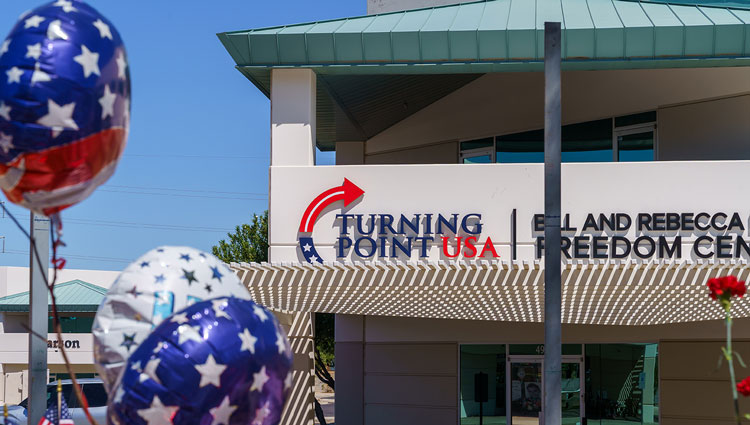“When people stop talking, really bad stuff starts. When marriages stop talking, divorce happens. When civilizations stop talking, civil war ensues. When you stop having a human connection with someone you disagree with, it becomes a lot easier to want to commit violence against that group.”
These are the words of now deceased Charlie Kirk. May he rest in peace.
“What we as a culture have to get back to is being able to have reasonable disagreement–where violence is not an option,” he continued.
In light of Kirk’s death, these words have an even greater impact and touch closer to the heart. Man, did I disagree with Kirk. Did I find his views to be wishy-washy and frustrating at times? Yes. Yes. Yes. Did I have a hard time understanding his logic? Yes. Did I want to debate him? Yes. And that’s the beauty of democracy. That’s the beauty of political difference.
Kirk and I disagreed on many topics, but what we agreed on–something that all Americans should agree on–is the importance of not just political tolerance, but political empathy. America was built on disagreement and difference–two values that we’ve rejected. As a culture, we’ve come to view differences as frightening, even fear-inducing.
But, what we need more than ever is the spirit of dialogue across differences. Out of this tragedy, may we search for hope.
Kirk energized young people, on the left and the right. He awakened conservative and liberal minds by sharing well-crafted, thought-provoking views with the world. For me, he solidified many of my views, which contradicted his own. He led people to stand up for what they believed, and he never hated people who thought differently than him.
Because Kirk knew one thing: talking keeps democracy alive. Kirk died with the hope that Americans–right, left, and everything in between–could have contentious, heated conversations and shake hands at the end of the day. He died with hope–with faith–in the American experiment and our country’s resilience. He died fighting for dialogue.
And online, many left-leaning Americans have been quick to jump to hate. Posing behind anonymous comments and private accounts, dark voices came to light, channeling mean, sinful tones of sarcasm and laughter at the brutal political murder of an individual who sought to understand where everyone was coming from. Even some political commentators–on air–spoke about Kirk’s death with a disconcerting insensitivity that reeks of lack of tolerance and understanding.
Through digital threads, hidden behind the Internet, a common and upsetting theme lies: yes, this is sad, but what about this? What about that? Or worse: this isn’t sad. Remember Kirk’s comment years ago about gun violence? He deserved this? The worst I’ve seen: his family is better off without him.
I hope hearing those thoughts makes you sick to your stomach, like those thoughts did for me. I hope it disgusts you and motivates you to seek out more disagreement and handle difference with respect and kindness. How heartless does one have to be to see another human being brutally murdered and try to suck empathy out of the situation because they found his views upsetting?
At the end of the day, politics aside, Kirk was a human, a father, a husband. He was someone.
And we should grieve the recent deaths of schoolchildren, Melissa Hortman, and fellow Americans. We need action, yes. And, we should grieve their deaths with the same kind of compassion and empathy as we have for those whose views we fundamentally disagree with.
Empathy isn’t supposed to be selective–it’s not a tool we employ when it serves our political agenda and reinforces our worldview. We can be disgusted by what happened to Kirk, pray for his family, and simultaneously grieve the tragedies that have plagued Americans at the hands of gun violence. The voices out there offering some sort of “justification” for Kirk’s murder are completely reprehensible and sick. Kirk believed in dialogue across differences, and he died because of that mission. At this time, remember the importance of political empathy, of listening and embracing those with perspectives that differ from your own.
We must remember: Kirk inspired us–his followers and dissenters alike. I disagreed with so much of what he spoke about. But I admired him nonetheless. Because Kirk knew that talking keeps democracy alive. In light of such a tragedy, pray. Pray loudly. But, don’t pray alone. We need to talk. Talk more, talk loudly. Talk with those who views you hate. Ask them out to lunch. Don’t let the conversation die. Don’t let the temperature rise any further. Conservatives, liberals, and “non-political” Americans: this is your call to action. Your call to talk. Your call to dialogue.
Words mean something. America fails when dialogue fails. Don’t let our democracy die in silence.


